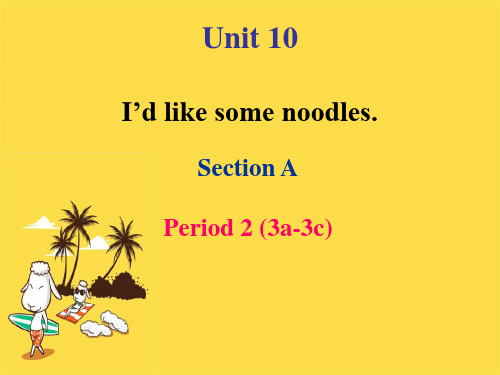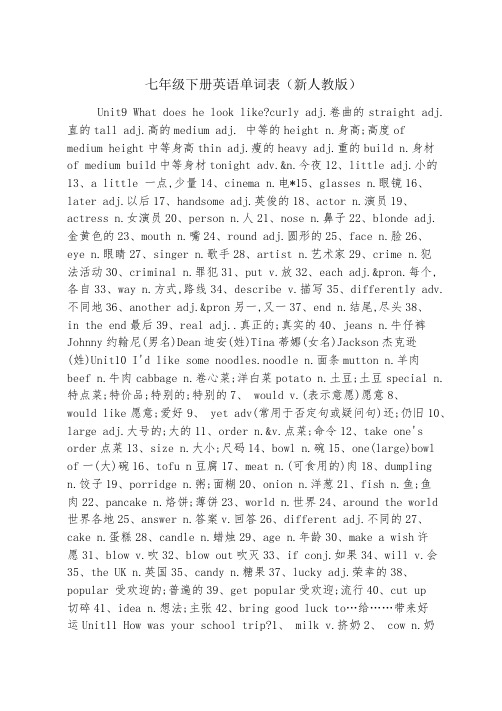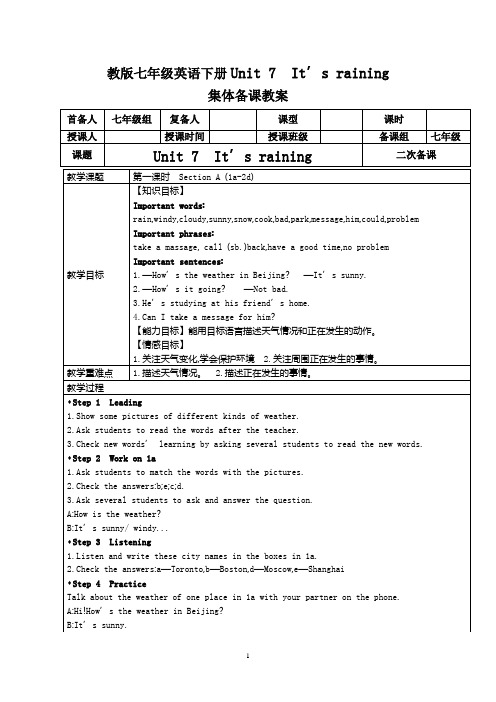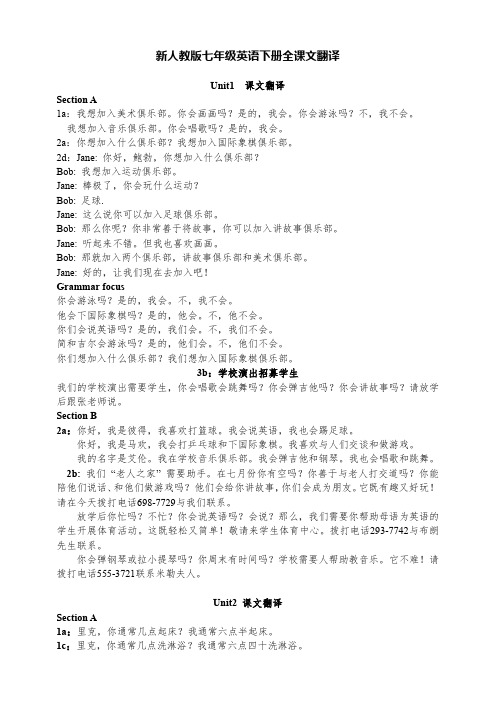新人教版七年级英语下册
英语七年级下册Unit10 GF(新人教版)

She/He would like…
She’d like… He’d like… What would they like? They would like… They’d like…
常用的量词shoestrousers一双鞋子一条裤子bread一片面包water一杯玻璃杯水water一杯咖啡杯水people一群人milk一包牛奶juice一瓶果汁coke一罐可乐twopairs其他的以此类推
Unit 10
I’d like some noodles.
Sectns
potatoes
Uncountable nouns
beef mutton
tomatoes
onions
chicken
rice
strawberries
apples
porridge
orange juice
eggs
oranges
green tea
用 a, an或 some填空。
四、可数名词前通常可用具体的数词来修饰。如:three women ten babies 不可数名词表示数量的多少时,必须与表示数量的名词连用,即"数词+表示数量的 名词(可数名词)+of+不可数名词"。如: two glasses of milk 两杯牛奶 five pieces of bread 五片面包 五、可数名词作主语时,谓语动词的单、复数与主语的单、复数须保持一致。不可 数名词作主语时,谓语动词只能用单数形式。如: There is some rice in the bowl.碗里有些米饭。 All the students are in the classroom.所有的学生都在教室里。 [友情提醒]如果不可数名词前有复数名词短语修饰时,谓语动词须用复数形式。如: There are two bags of rice in the room. 房间里有两袋大米。 六、对可数名词的数量提问用how many; 对不可数名词的数量提问要用how much,但对不可数名词前表示数量名词中的修饰语提问时要用how many。如: I can see two pictures on the wall. → How many pictures can you see on the wall? There is a lot of pork in the basket. → How much pork is there in the basket? I want three glasses of water. → How many glasses of water do you want? 七、另外,有些集合名词也是可数名词,但不同的是,它们以单数形式出现,表示 复数概念,如people,police,family等;而有些可数名词 本身就以复数形式出现,如 clothes,glasses(眼镜)等;有的可数名词单、复数形式相同,如Japanese,sheep, Chinese等。如: The Chinese people are hardworking and brave.中国人民勤劳勇敢。 The sports clothes are new. 这些运动服是新的。 I have one sheep. He has two sheep. 我有一只羊,他有三只羊
七年级下册英语单词表(新人教版)

七年级下册英语单词表(新人教版)Unit9 What does he look like?curly adj.卷曲的straight adj.直的tall adj.高的medium adj. 中等的height n.身高;高度of medium height中等身高thin adj.瘦的heavy adj.重的build n.身材of medium build中等身材tonight adv.&n.今夜12、little adj.小的13、a little 一点,少量14、cinema n.电*15、glasses n.眼镜16、later adj.以后17、handsome adj.英俊的18、actor n.演员19、actress n.女演员20、person n.人21、nose n.鼻子22、blonde adj.金黄色的23、mouth n.嘴24、round adj.圆形的25、face n.脸26、eye n.眼睛27、singer n.歌手28、artist n.艺术家29、crime n.犯法活动30、criminal n.罪犯31、put v.放32、each adj.&pron.每个,各自33、way n.方式,路线34、describe v.描写35、differently adv.不同地36、another adj.&pron另一,又一37、end n.结尾,尽头38、in the end最后39、real adj..真正的;真实的40、jeans n.牛仔裤Johnny约翰尼(男名)Dean迪安(姓)Tina蒂娜(女名)Jackson杰克逊(姓)Unit10 I'd like some noodles.noodle n.面条mutton n.羊肉beef n.牛肉cabbage n.卷心菜;洋白菜potato n.土豆;土豆special n.特点菜;特价品;特别的;特别的7、 would v.(表示意愿)愿意8、would like愿意;爱好9、 yet adv(常用于否定句或疑问句)还;仍旧10、large adj.大号的;大的11、order n.&v.点菜;命令12、take one's order点菜13、size n.大小;尺码14、bowl n.碗15、one(large)bowl of一(大)碗16、tofu n豆腐17、meat n.(可食用的)肉18、dumpling n.饺子19、porridge n.粥;面糊20、onion n.洋葱21、fish n.鱼;鱼肉22、pancake n.烙饼;薄饼23、world n.世界24、around the world世界各地25、answer n.答案v.回答26、different adj.不同的27、cake n.蛋糕28、candle n.蜡烛29、age n.年龄30、make a wish许愿31、blow v.吹32、blow out吹灭33、if conj.如果34、will v.会35、the UK n.英国35、candy n.糖果37、lucky adj.荣幸的38、popular 受欢迎的;普遍的39、get popular受欢迎;流行40、cut up切碎41、idea n.想法;主张42、bring good luck to…给……带来好运Unit11 How was your school trip?1、 milk v.挤奶2、 cow n.奶牛3、 milk a cow给奶牛挤奶4、 horse n.马5、 ride a horse骑马6、 feed v.豢养;饲养7、 feed chickens喂鸡8、 farmer n.农民;农场主9、 quite adv.相当;安全10、quite a lot(of…) 许多11、anything pron.(常用于否定句或疑问句)任何东西;任何事物12、grow v.种植;生长;发育13、farm n.农场;务农;种田14、pick v.采;摘15、excellent adj.极好的;优秀的16、countryside n.乡村;农村17、in the countryside在乡下;在农村18、yesterday n.昨天19、 n.花20、worry v.担忧;担忧21、luckily adv.荣幸地;好运地22、sun n.太阳23、museum n.博物馆24、fire n.火灾25、fire station 消防站26、painting n.油画;绘画27、exciting adj.使人兴奋的;令人激动的28、lovely adj.可爱的29、expensive adj.昂贵的30、cheap adj.便宜的;便宜的31、slow adj.缓慢的;迟缓的32、fast adv&adj快地(的)33、robot n.机器人34、guide n.导游;向导35、gift n.礼物;赠品36、all in all总的说来37、everything pron一切;所有事物38、interested adj.感爱好的39、be interested in对……感爱好40、dark adj.黑暗的;昏暗的41、hear(heard) v.听到;听见42、Carol卡罗尔(女名)Unit12 What did you do last weekend?camp v.扎营;扎帐篷lake n.湖,湖泊beach n.海滩,沙滩badminton n.羽毛球运动sheep n.羊,绵羊as adv.&pron作为,当做natural pron自然的butterfly n.蝴蝶visitor n.游客;拜访者9、 tired adj.疲惫的10、stay v.停留11、stay up late深夜不留12、away adv.离开13、run away 跑开14、mouse n.老鼠15、baby n.幼小的16、shout v.呼唤,喊叫17、shout at…冲……大声叫唤18、woof interg(狗叫声)汪汪19、language n.语言20、fiy v.飞21、kite n.风筝22、fiy a kite放风筝23、high adj.&adv高的(地)24、high school中学25、ago adv.以前26、India n.印度27、tent n.帐篷28、put up搭起,举起29、moon n.月亮30、surprise n.&v.惊奇,惊奇31、get a surpris吃惊32、snake n.蛇33、scared adj.惶恐的34、move v.移动35、shout to…对……大声喊叫36、start v.开始,着手37、jump v.跳跃38、up and down上上下下39、wake v.弄醒,醒40、into prep.到……里面41、forest n.森林42、ear n.耳朵43、Lucy露西(女名)。
(新)人教版新目标七年级英语下册(Unit7-Uni8)集体备课教案设计

Learn the sentences in Grammar Focus by heart.
板书设计
Section A(Grammar Focus-3b)
重点短语
1.talk on the phone
2.make soup
3.right now
重点句型
1.How’s the weather?—It’s cloudy./ It’s sunny./ It’s raining.
课时
授课人
授课时间
授课班级
备课组
七年级
课题
Unit 7It’s raining
二次备课
教学课题
第二课时Section A(Grammar Focus-3b)
教学目标
【知识目标】
Important word:again
Important phrases:
every Saturday,play basketball,in the park,talk on the phone,make soup,right now,study Chinese
Important phrases:
take a massage,call(sb.)back,have a good time,no problem
Important sentences:
1.—How’s the weather in Beijing?—It’s sunny.
2.—How’s it going?—Not bad.
Keys:1.cloudy2.raining3.sunny4.windy5.snowing
Ⅱ.根据汉语意思完成句子
1.她在公园正玩得开心。
新人教版七年级英语下册全课文翻译(修改版)

新人教版七年级英语下册全课文翻译Unit1 课文翻译Section A1a:我想加入美术俱乐部。
你会画画吗?是的,我会。
你会游泳吗?不,我不会。
我想加入音乐俱乐部。
你会唱歌吗?是的,我会。
2a:你想加入什么俱乐部?我想加入国际象棋俱乐部。
2d:Jane: 你好,鲍勃,你想加入什么俱乐部?Bob: 我想加入运动俱乐部。
Jane: 棒极了,你会玩什么运动?Bob: 足球.Jane: 这么说你可以加入足球俱乐部。
Bob: 那么你呢?你非常善于将故事,你可以加入讲故事俱乐部。
Jane: 听起来不错。
但我也喜欢画画。
Bob: 那就加入两个俱乐部,讲故事俱乐部和美术俱乐部。
Jane: 好的,让我们现在去加入吧!Grammar focus你会游泳吗?是的,我会。
不,我不会。
他会下国际象棋吗?是的,他会。
不,他不会。
你们会说英语吗?是的,我们会。
不,我们不会。
简和吉尔会游泳吗?是的,他们会。
不,他们不会。
你们想加入什么俱乐部?我们想加入国际象棋俱乐部。
3b:学校演出招募学生我们的学校演出需要学生,你会唱歌会跳舞吗?你会弹吉他吗?你会讲故事吗?请放学后跟张老师说。
Section B2a:你好,我是彼得,我喜欢打篮球。
我会说英语,我也会踢足球。
你好,我是马欢,我会打乒乓球和下国际象棋。
我喜欢与人们交谈和做游戏。
我的名字是艾伦。
我在学校音乐俱乐部。
我会弹吉他和钢琴。
我也会唱歌和跳舞。
2b: 我们“老人之家” 需要助手。
在七月份你有空吗?你善于与老人打交道吗?你能陪他们说话、和他们做游戏吗?他们会给你讲故事,你们会成为朋友。
它既有趣又好玩!请在今天拨打电话698-7729与我们联系。
放学后你忙吗?不忙?你会说英语吗?会说?那么,我们需要你帮助母语为英语的学生开展体育活动。
这既轻松又简单!敬请来学生体育中心。
拨打电话293-7742与布朗先生联系。
你会弹钢琴或拉小提琴吗?你周末有时间吗?学校需要人帮助教音乐。
它不难!请拨打电话555-3721联系米勒夫人。
新人教版七年级下册英语单词表(含音标全册)

Unit 1 Can you play the guitar/ɡɪ'tɑ:(r)/ n.吉他/sɪŋ/ v.唱;唱歌/swɪm/ v.&n.游泳/dɑ:ns/, /dæns/ v.跳舞;n.舞蹈/drɔ:/ v.画/tʃes/ n.国际象棋下国际象棋/spi:k/ v.说(某种语言);说话说英语/dʒɔɪn/ v.参加;加入/klʌb/ n.俱乐部;社团擅长于…/tel/ v.讲述;告诉/'stɔ:ri/ n.故事;小说/raɪt/ v.写作;写字/ʃəʊ/ n.演出;节目; v.给…看;展示/ɔ:(r)/ conj.或者;也不(用于否定句)/tɔ:k/ v.&n.说话;交谈跟……说/kʌŋ'fu:/ n.(中国)功夫/drʌm/ n.鼓敲鼓/pi'ænəʊ/ n.钢琴弹钢琴/vaɪə'lɪn/ n.小提琴拉小提琴/'ɔ:lsəʊ/ adv.也;而且/'pi:pl/ n.人;人们/həʊm/ n.家;活动本部; adv.到家;在家善于应付……的;对……有办法/meɪk/ v.使成为;制造结交朋友/tə'deɪ/ adv.在今天在某方面帮助(某人)/'sentə(r)/ n.中心;中央/wi:k'end/, /'wi:kend/ n.周末(在)周末/ti:tʃ/ v.教;讲授/mju:'zɪʃn/ n.音乐家Unit 2 What time do you go to school/ʌp/ adv.向上起床;站起/dres/ v.&n.穿衣服;连衣裙穿上衣服/brʌʃ/v.&n.刷;刷净;刷子/tu:θ/ n.(pl. teeth /ti:θ/)牙齿/'ʃaʊə(r)/ n.&v.淋浴;淋浴器(间)洗淋浴/'ju:ʒuəli/ adv.通常地;一般地/'fɔ:(r)ti/ num.四十/waʊ/ int.(表示惊奇或敬佩)哇;呀/'nevə(r)/ adv.从不;绝不/'ɜ:(r)li/ adv.&adj.早(的)/'fɪfti/ num.五十/dʒɒb/, /dʒɑ:b/ n.工作;职业/wɜ:(r)k/ v.&n.工作/'steɪʃn/ n.电(视)台;车站广播电台"/ə'klɒk/, /ə'klɑ:k/" adv.……点钟/naɪt/ n.晚上;夜晚/'fʌni/ adj.奇怪的;滑稽好笑的/'eksəsaɪz/ v.&n.锻炼;练习(在)周末/best/adj.&adv.最好的;最好地;最/ɡru:p/ n.组;群/hɑ:f/, /hæf/ n.&pron.一半;半数/pɑ:st/prep.晚于;过adj.过去的/'kwɔ:(r)tə(r)/n.一刻钟;四分之一/'həʊmwɜ:(r)k/ n.家庭作业做作业/rʌn/ v.跑;奔/kli:n/ v.打扫;弄干净; adj.干净的/wɔ:k/ n.&v.行走;步行散步;走一走/'kwɪkli/ adv.很快地"/'aɪðə(r)/, /'i:ðə(r)/" adv.或者;也要么…要么…;或者…或者…/lɒt/, /lɑ:t/ pron.大量;许多大量;许多/'sʌmtaɪmz/ adv.有时/teɪst/ v.有…的味道;品尝; n.味道;/laɪf/ n. (pl. lives /laɪvz/)生活;生命Unit 3 How do you get to school/treɪn/ n.火车/bʌs/ n.公共汽车/'sʌbweɪ/ n.地铁乘地铁/raɪd/ v.&n.骑;旅程/baɪk/ n.自行车骑自行车/'sɪksti/num.六十/'sevnti/ num.七十/'eɪti/ num.八十/'naɪnti/ num.九十/'hʌndrəd/ num.一百/'mɪnɪt/ n.分钟/fɑ:(r)/ adv.&adj.远;远的/'kɪləmi:tə/, /kɪ'lɑ:mi:tər/ n.千米;公里/nju:/, /nu:/ adj.新的;刚出现的/'evri/ adj.每一;每个每天/baɪ/ prep.(表示方式)乘(交通工具)骑自行车/draɪv/ v.开车/kɑ:(r)/ n.小汽车;轿车/lɪv/ v.居住;生活/stɒp/, /stɑ:p/ n.车站;停止认为/krɒs/, /krɔ:s/ v.横过;越过/'rɪvə(r)/ n.河;江/'meni/ a dj.&pron.许多/'vɪlɪdʒ/ n.村庄;村镇/bɪ'twi:n/ prep.介于……之间在……和……之间/brɪdʒ/ n.桥/bəʊt/ n.小船/'rəʊp,weɪ/ n.索道/jɪə/, /jɪr/ n.年;岁/ə'freɪd/ adj.害怕;畏惧/laɪk/ prep.像;怎么样/'vɪlɪdʒə(r)/ n.村民/li:v/ v.离开/dri:m/ n.梦想;睡梦;v.做梦/tru:/ adj.真的;符合事实的实现;成为现实Unit 4 Don’t eat in class/ru:l/ n.规则;规章/ə'raɪv/ v.到达准时/'hɔ:lweɪ/ n.走廊;过道/hɔ:l/ n.大厅;礼堂/'daɪnɪŋ/ 餐厅/'lɪsn/ v.听;倾听听……/faɪt/ v.&n.打架;战斗/'sɒri/, /'sɑ:ri/ adj.抱歉的;难过/aʊt'saɪd/ adv.在外面; adj.外面的/weə/, /wer/ v.穿;戴/ɪm'pɔ:(r)tnt/ adj.重要的/brɪŋ/ v.带来;取来/'ju:nɪfɔ:(r)m/ n.校服;制服/'kwaɪət/ adj.安静的/aʊt/ adv.外出外出(娱乐)/'præktɪs/ v.&n.练习/dɪʃ/ n.碟;盘清洗餐具/bɪ'fɔ:(r)/prep.&conj.在…以前;adv.铺床/'dɜ:(r)ti/ adj.脏的/'kɪtʃɪn/ n.厨房/mɔ:(r)/ adj.&pron.更多(的)/'nɔɪzi/ adj.吵闹的/rɪ'læks/ v.放松;休息/ri:d/ v.读;阅读/'terəbl/ adj.非常讨厌的;可怕的/fi:l/ v.感受;觉得/strɪkt/ adj.严格的;严厉的(对某人)要求严格/rɪ'membə(r)/ v.记住;记起"/'fɒləʊ/,/'fɑ:ləʊ/" v.遵循;跟随遵守规则/lʌk/ n.幸运;运气/ki:p/ v.保持;保留/heə/, /her/ n.头发;毛发/lɜ:(r)n/ v.学习;学会Unit 5 What do you like pandas/'pændə/ n.熊猫/zu:/ n.动物园/'taɪgə(r)/ n.老虎/'elɪfənt/ n.大象/kəʊ'ɑ:lə/ n.树袋熊;考拉/'laɪən/ n.狮子/dʒə'rɑ:f/, /dʒə'ræf/ n.长颈鹿/'ænɪml/ n.动物/kju:t/ adj.可爱的;机灵的/'leɪzi/ adj.懒散的;懒惰的/smɑ:(r)t/ adj.聪明的/'bju:tɪfl/ adj.美丽的;美好的/'skeəri/, /'skeri/ adj.吓人的;恐怖的/kaɪnd/ n.种类稍微;有点儿/ɒ'streɪlɪə/ n.澳大利亚/saʊθ/ a dj.南方的; n.南;南方/'æfrɪkə/ n.非洲南非/pet/ n.宠物/leg/ n.腿/kæt/ n.猫/sli:p/ v.&n.睡觉/'frendli/ adj.友好的/ʃaɪ/ adj.羞怯的;腼腆的/seɪv/ v.救;救助/'sɪmbl/ n.象征/flæg/ n.旗;旗帜/fə(r)'get/ v.忘记;遗忘迷路/pleɪs/ n.地点;位置"/'wɔ:tə/, /'wɑ:tər/" n.水/'deɪndʒə(r)/ n.危险处于(极大)危险之中/kʌt/ v.砍;切/daʊn/ adv.(坐、躺、倒)下; prep.向下;沿着砍倒/tri:/ n.树/kɪl/ v.杀死;弄死/'aɪvəri/ n.象牙/'əʊvə(r)/ prep.超过,多于由……制成的Unit 6 I’m watching TV/'nju:zpeɪpə/, /'nu:zpeɪpər/ n.报纸看报纸/ju:z/ v.使用;运用/su:p/ n.汤做汤/wɒʃ/, /wɔ:ʃ/ v.洗/'mu:vi/ n.电影看电影/dʒʌst/ adv.只是;恰好出去吃饭/haʊs/ n.房子/drɪŋk/ v..喝; n饮料/ti:/ n.茶;茶叶喝茶/tə'mɒrəʊ/, adv.在明天; n.明天;未来/pu:l/ n.游泳池;水池/ʃɒp/, / v.购物; n.商店/'su:pə(r),mɑ:(r)kət/ n.超市/mæn/ n.男人;人/reɪs/ n.竞赛/həʊst/ n.主人;东道主/'stʌdi/ v.&n.学习;研究/steɪt/ n.州/ju'naɪtɪd 'steɪts/ 美国/ə'merɪkən/ adj.美国的;美洲的;n. 美国人;美洲人/'drægən/ n.龙端午节/'eni/ adj.任何的;任一的; pron.任何;任一/'ʌðə(r)/ adj.另外的;其他的;pron.另外的人(或物)/jʌŋ/ adj.幼小的;年轻的/tʃaɪld/n.(pl. children /tʃɪldrən/)儿童/mɪs/ v.怀念;怀念/wɪʃ/ v.希望/dɪ'lɪʃəs/ adj.可口的;美味的/stɪl/ adv.还;仍然/'lɪvɪŋ/ 客厅Unit 7 It's raining!/reɪn/ v.下雨; n.雨水/'wɪndi/ adj.多风的/'klaʊdi/ adj.多云的/'sʌni/ a dj.晴朗的/snəʊ/ v.下雪; n.雪/'weðə(r)/ n.天气/kʊk/ v.做饭/bæd/ a dj.坏的;糟的/pɑ:(r)k/ n.公园/'mesɪdʒ/ n.信息;消息捎个口信;传话/hɪm/ pron.他(he的宾格)/kʊd/ modal v.能;可以/bæk/ a dv.回来;回原处(给某人)回电话/'prɒbləm/, n.困难;难题/ə'ɡen/, adv.再一次;又一次/draɪ/ adj.干燥的/kəʊld/ adj.寒冷的;冷的/hɒt/, /hɑ:t/ adj.热的/wɔ:(r)m/ adj.温暖的/'vɪzɪt/v.拜访;参观/'kænədə/ n.加拿大/'sʌmə(r)/ n.夏天;夏季/sɪt/ v.坐/dʒu:s/ n.果汁;饮料/su:n/ a dv.不久;很快/veɪ'keɪʃn/ n.假期度假/hɑ:(r)d/ adv.努力地; adj.困难的/'jʊərəp/ n.欧洲/'maʊntən/ n.高山/'kʌntri/ n.国;国家/skeɪt/ v.滑冰/'snəʊi/ adj.下雪的/'wɪntə(r)/ n.冬天;冬季/'rʌʃn/ adj.俄罗斯的; n.俄罗斯人;/'snəʊmæn/ n.雪人/'reɪni/ adj.阴雨的;多雨的Unit 8 Is there a post office near here?/pəʊst/ n.邮政/'ɒfɪs/, /'ɑ:fɪs/ n.办公室邮局/pə'li:s/ n.警察警察局/həʊ'tel/ n.旅馆;酒店/'restrɒnt/, /'restərɑ:nt/ n.餐馆/bæŋk/ n.银行"/'hɒspɪtl/,/'hɑ:spɪtl/" n.医院/stri:t/ n.大街/peɪ/ v.&n.付费付费电话/nɪə/, /nɪr/ prep.在……附近/ə'krɒs/, /ə'krɔ:s/ adv.&prep穿过在……对面/frʌnt/ n.前面在……前面/bɪ'haɪnd/ prep.在……后面/taʊn/ n.镇;市镇/ə'raʊnd/ adv.&prep.到处;大约/nɔ:(r)θ/ n.北;北方; adj.北方的"/ə'lɒŋ/, /ə'lɔ:ŋ/" prep.沿着沿着(这条街)走/tɜ:(r)n/ v.转向;翻/raɪt/ adv.&n.向右边;右边/left/ adv.&n.向左边;左边向右/左转/'krɒsɪŋ/, /'krɔ:sɪŋ/ n.十字路口/'neɪbə(r)hʊd/ n.街区;街坊/spend/ v.花(时间、钱等)花时间/klaɪm/ v.爬/rəʊd/n.路/'ɒfn/, /'ɔ:fn/ adv.时常;常常/eə/, /er/ n.空气/'sʌnʃaɪn/ n.阳光/fri:/ adj.免费的/ɪn'dʒɔɪ/ v.享受;喜爱喜欢阅读/'i:zəli/ adv.容易地/'mʌni/ n.钱Unit 9 What does he look like?/'kɜ:(r)li/ adj.卷曲的/streɪt/ adj.直的/tɔ:l/ adj.高的/'mi:diəm/ a dj.中等的/haɪt/ n.身高;高度中等身高/θɪn/ adj.瘦的/'hevi/ adj.重的/bɪld/ n.身材中等身材/tə'naɪt/ adv.&n.(在)今晚;(在)今夜/'lɪtl/ adj.小的一点;少量/'sɪnəmə/ n.电影院/'glɑ:sɪz/, /'glæsɪz/ n.(pl.)眼睛/'leɪtə(r)/ adv.以后/'hænsəm/ adj.英俊的/'æktə(r)/ n.演员/'æktrəs/ n.女演员/'pɜ:(r)sn/ n.人/nəʊz/n.鼻子/blɒnd/, /blɑ:nd/ adj.金黄色的/maʊθ/ n.嘴/raʊnd/ adj.圆形的/feɪs/ n.脸/aɪ/ n.眼睛/'sɪŋə(r)/ n.歌手/'ɑ:(r)tɪst/ n.艺术家/kraɪm/ n.犯罪活动/'krɪmɪnl/ n.罪犯/pʊt/ v.放/i:tʃ/ adj.&pron.每个;各自/weɪ/ n.方式;路线/dɪ'skraɪb/ v.描述/'dɪfərəntli/ adv.不同地/ə'nʌðə(r)/ adj.&pron.另一;又一/end/ n.结尾;尽头最后/rɪəl/ adj.真正的;真实的/dʒi:nz/ n.牛仔裤Unit 10 I'd like some noodles./'nu:dl/ n.面条/'mʌtn/ n.羊肉/bi:f/ n.牛肉/'kæbɪdʒ/ n.卷心菜;洋白菜/pə'teɪtəʊ/ n.土豆;马铃薯/'speʃəl/ n.特色菜;特价品;adj.特别的;特殊的/wʊd/ modal v.(表示意愿)愿意;喜欢/jet/ adv.(常用于否定句或疑问句)还;仍然/lɑ:(r)dʒ/ adj.大号的;大的/'ɔ:(r)də(r)/ n.&v.点菜;命令点菜/saɪz/ n.大小;尺码/bəʊl/ n.碗一(大)碗.../'təʊfu:/ n.豆腐/mi:t/ n.(可食用的)肉/'dʌmplɪŋ/ n.饺子/'pɒrɪdʒ/, /'pɔ:rɪdʒ/ n.粥;面糊/'ʌnjən/ n.洋葱/fɪʃ/ n.鱼;鱼肉/'pænkeɪk/ n.烙饼;薄饼/wɜ:(r)ld/ n.世界世界各地/'ɑ:nsə/, /'ænsər/ n.答案; v.回答/'dɪfərənt/ adj.不同的/keɪk/ n.蛋糕/'kændl/ n.蜡烛/eɪdʒ/ n.年龄许愿/bləʊ/ v.吹吹灭/ɪf/ conj.如果/wɪl/ v.将要;会/,ju:'keɪ/ n.英国/'kændi/ n.糖果/'lʌki/ adj.幸运的/'pɒpjʊlə/, /'pɑ:pjʊlər/" adj.受欢迎的;普遍的受欢迎;流行切碎/aɪ'dɪə/, /aɪ'dɪr/ n.想法;主意给……带来好运Unit 11 How was your school trip?/mɪlk/ v.挤奶/kaʊ/ n.奶牛给奶牛挤奶/hɔ:(r)s/ n.马骑马/fi:d/ v. (fed /fed/ )喂养;饲养喂鸡/'fɑ:(r)mə(r)/ n.农民;农场主/kwaɪt/ adv.相当;完全许多/'enɪθɪŋ/ pron.(常用于否定句或疑问句) 任何东西;任何事物/grəʊ/v.( /gru:/)种植;生长;发育/fɑ:(r)m/ n.农场; v.务农;种田/pɪk/ v.采;摘/'eksələnt/ adj.极好的;优秀的/'kʌntrisaɪd/ n.乡村;农村在乡下;在农村/'jestə(r)di/ adv.昨天/'flaʊə(r)/ n.花/'wʌri/, /'wɜ:ri/ v.&n.担心;担忧/'lʌkɪli/ adv.幸运地;好运地/sʌn/ n.太阳/mju:'ziəm/ n.博物馆/'faɪə(r)/ n.火;火灾消防站/'peɪntɪŋ/ n.油画;绘画/ɪk'saɪtɪŋ/ adj.使人兴奋的;令人激动的/'lʌvli/ adj.可爱的/ɪk'spensɪv/ adj.昂贵的/tʃi:p/ adj.廉价的;便宜的/sləʊ/ adj.缓慢的;迟缓的/fɑ:st/, /fæst/ adv.&adj.快地(的)/'rəʊbɒt/, /'rəʊbɑ:t/ n.机器人/gaɪd/ n.导游;向导/gɪft/ n.礼物;赠品总的说来/'evriθɪŋ/ pron.所有事物;一切/'ɪntrəstɪd/ adj.感兴趣的对……感兴趣/dɑ:(r)k/ adj.黑暗的;昏暗的/hɪə/, /hɪr/ v.(heard /hɜ:(r)d/)听到;听见Unit 12 What did you do last weekend?/kæmp/ v.扎营;搭帐篷/leɪk/ n.湖;湖泊/bi:tʃ/ n.海滩;沙滩/'bædmɪntən/ n.羽毛球运动/ʃi:p/ n.羊;绵羊/æz, əz/ prep.&adv.作为;当作/'nætʃərəl/ adj.自然的/'bʌtə(r)flaɪ/ n.蝴蝶/'vɪzɪtə(r)/ n.游客;访问者/taɪə(r)d/ adj.疲倦的;疲劳的/steɪ/ v.停留;待深夜不睡;熬夜/ə'weɪ/ adv.离开;远离跑开/maʊs/ n.(pl. mice /maɪs/)老鼠;耗子/'beɪbi/ adj.幼小的; n.婴儿/ʃaʊt/ v.呼叫;喊叫冲……大声叫嚷/wʊf/ int.(狗叫声)汪汪/'læŋgwɪdʒ/ n.语言/flaɪ/ v. (flew /flu:/)飞/kaɪt/ n.风筝放风筝/haɪ/ adj.&adv.高的(地)中学/ə'gəʊ/adv.以前/'ɪndiə/n.印度/tent/ n.帐篷搭起;举起/mu:n/ n.月亮/sə(r)'praɪz/n.惊奇;惊讶; v.使吃惊吃惊/sneɪk/n.蛇/skeəd/, /skerd/ adj.惊慌的;吓坏了的/mu:v/ v.移动对……大声喊叫/stɑ:(r)t/ v.开始;着手/dʒʌmp/ v.跳;跃上上下下;起伏/weɪk/ v.(woke /wəʊk/)弄醒;醒把……弄醒/'ɪntu:/ prep.到……里面;进入/'fɒrɪst/, /'fɔ:rɪst/ n.森林/ɪə/, /ɪr/ n.耳朵2016年七年级英语下册Units1-12语法练习题一.用括号中所给词的适当形式填空。
新版人教版七年级下册英语单词表全册

生活;生命
七下 Unit 3 train bus
subway take the subway
ride bike ride a bike
n. n. n.
v.&n. n.
火车 公共汽车
地铁 乘地铁 骑;旅程 自行车 骑自行车
sixty seventy eighty ninety hundred minute
吉他 唱;唱歌
游泳 跳舞;舞蹈
画 国际象棋 下国际象棋 说(某种语言);说话
说英语 参加;加入 俱乐部;社团 擅长于… 讲述;告诉 故事;小说 写作;写字 演出;节目;给…看;展示 或者;也不(用于否定句) 说话;交谈 跟……说 (中国)功夫
鼓 敲鼓 钢琴 弹钢琴 小提琴 拉小提琴 也;而且 人;人们 家;活动本部;到家;在家 善于应付……的;对……有办法
v.&n. n.
prep.&adv .
adj. n.
离开 梦想;睡梦;做梦 真的;符合事实的 实现;成为现实
规则;规章 到达 准时
走廊;过道 大厅;礼堂
餐厅 听;倾听 听…… 打架;战斗 抱歉的;难过的;惋惜的 在外面;外面的
穿;戴 重要的 带来;取来 校服;制服 安静的
外出 外出(娱乐)
练习 碟;盘 清洗餐具 在……以前;以前 铺床 脏的 厨房
num. num. num. num. num.
n. adv.&adj.
n. adj. adj.
prep.
v. n. v. n.
v. n. adj.&pron . n. prep.
n. n. n. n. adj. prep. n.
新人教版七年级英语下册全册教案

新人教版七年级英语下册全册教案Unit 1 Can you play the guitar?Section A (1a-2d)一、教学目标:1. 语言知识目标:1) 能掌握以下单词:guitar, sing, swim, dance, chess, play chess, draw, speak, speak English, join, club 能掌握以下句型:①—Can you play the guitar? —Yes, I can./ No, I can't.②—What can you do? —I can dance.③—What club do you want to join? —I want to join the chess club.2) 能了解以下语法:情态动词c an 的用法want to do sth.的用法2.情感态度价值观目标:的某一方面己或对方在该部分内容贴近学生的生活,谈论的话题是能力。
通过互相询问或谈论自能力,可以培养学生的一种群体意识。
二、教学重难点1. 教学重点:1) 学习询问和谈论彼此的能力和特长;2) 掌握一些弹奏乐器的表达方式。
2. 教学难点:c an 的构成和使用。
情态动词三、教学过程Ⅰ. Lead in1. 教师可携带一些易于演奏的乐器,也可带一些演奏乐器的图片,一边演示乐器,一边说:I can playthe guitar.⋯等;再指着图片说:He/She can play the violin .But I can ’t pl.a y等it;然后询问学。
生:Can you play the guitar? .⋯并引导学生进行简单的回答2. S s look at the picture in 1a. Then read the words and phrases. Let Ss match the activities with thepeople.Then Check the answers with the class together.Ⅱ. Presentation出示一些反映各种活动的图片、幻灯片或播放课件,引导学生谈论活动:He/She can dance/swim/sing/" ··But I can ’/t s d w a n i m c e/sing/...等,学习表达活动的动词短语。
新人教版七年级下册英语所有语法知识点全汇总

新人教版七年级下册所有语法知识点全汇总一. 情态动词can的用法can+动词原形,它不随主语的人称和数而变化。
1. 含有can的肯定句:主语+can+谓语动词的原形+其他。
2. 含有can的否定句:主语+can't+动词的原形+其他。
3. 变一般疑问句时,把can提前:Can+主语+动词原形+其他?肯定回答:Yes,主语+can。
否定回答:No,主语+can't.4. 含有can的特殊疑问句:特殊疑问词+can+主语+动词原形+其他?I can speak English.→I can't speak English.→Can you speak English? →What can you speak?二. what time和when引导的特殊疑问句1. 询问钟点时用what time,询问日期、月份、年份时用when。
2. What's the time?=What time is it?现在几点了?3. 时刻表达法:顺读法和逆读法。
顺读法:“钟点+分钟”直接读数字。
如:7: 05 seven five;8:16 eight sixteen逆读法:借助介词past或to表示,要先说分再说钟点。
a. 当分钟不超过30分钟时(包括30分钟),即<或=30,用past表示。
其结构为:“分钟+past+整点”意为“几点过几分”。
如:1:25 twenty-five past oneb. 当超过30分钟时,即>30,用to表示。
其结构为:“所差分钟(即60—所过分钟数)+to+下一个整点”,to译成“差”,差几分钟到几点。
如:4:38 twenty-two to fivec. 当分钟为30分钟用half表示,当分钟为15分钟用a quarter。
三. how引导的特殊疑问句1. how 引导的特殊疑问句提问交通方式,其答语分三种情况:a. take a/an/the+交通工具(单数)b. by+交通工具(单数)c. on/in+限定词+交通工具---How do you go to school every day?---I take a bus to go to school every day./I go to school by bus every day./I goto school on the bus every day.2. how far 用来提问距离,多远,其答语分为两种:(1)用长度单位表示:It is five kilometers.(2)用时间表示:It’s twenty minutes’walk.3. how long 用来提问时间,意为多久回答常用“for+段时”。
- 1、下载文档前请自行甄别文档内容的完整性,平台不提供额外的编辑、内容补充、找答案等附加服务。
- 2、"仅部分预览"的文档,不可在线预览部分如存在完整性等问题,可反馈申请退款(可完整预览的文档不适用该条件!)。
- 3、如文档侵犯您的权益,请联系客服反馈,我们会尽快为您处理(人工客服工作时间:9:00-18:30)。
6. What lesson did Lisa learn from the weekend?
_S_n_a_k_e_s_d__o_n_’t_h_a_v_e__e_a_r_s_b_u_t_t_h_e_y___ _c_a_n_f_e_e_l _th__in_g_s__m_o_v_i_n_g_._I_t’_s_______ _im__p_o_r_ta_n_t_n__o_t _to__g_o__n_e_ar a snake.
Describe what you did on your last weekend to your classmates.
My last weekend was interesting. I visited my grandparents. They lived in a small village. I fed the chickens and sheep. I went fishing with my grandpa.
2c Put the phrases in order according to the passage. The use them to retell the story.
___ snake went into the forest ___ put up our tents and cooked food ___ learned a useful lesson ___ saw a snake and shouted to parents
weekend? 3. How did Lisa feel when she saw the
snake?
4. What did Lisa and her sister do? 5. What did their parents do? Why
did they do that? 6. What lesson did Lisa learn from
tent
put up
put up a tent scared
wake up
Read about Lisa’s weekend. Tick
2b
(√) the right pictures.
their air ride went camping in made a fire was short a small village to cook food
in India.” 3. 第三到第五小题的依据是短文中第三
段,清晨他们看到蛇后,所发生的事 情。最后一小题的回答依据是短文的 最后三句话。
1. How was Lisa’s weekend? _It__w_a_s__in__te_r_e_s_t_i_n_g__b_u_t_s_c__a_ry_.____
the weekend?
1. 先认真读这六个问题,掌握其意思。 2. 带着问题再去读短文,在短文中寻找
回答问题的相关依据。比如:回答第 一题的依据是第一段的最后一句话 “Last weekend was interesting and scary.”
第二题的依据是第二段的第一句话 “We went camping in a small village
4. What did Lisa and her sister do? T_h__e_y_s_h_o_u_t_e_d__to__th_e_i_r_p_a_r_e_n_t_s_t_o___ l_e_t_t_h_e_m__k_n_o_w__th__e_d_a_n_g_e_r_.
5. What did their parents do? H__e_r _fa_t_h_e_r_j_u_m_p__e_d_u_p__a_n_d__d_o_w_n___ _in__th_e_i_r_t_e_n_t.__ Why did they do that? H_e__w_a_n_t_e_d_t_o__w_a_k_e__u_p_t_h_e_s_n__a_k_e_. ___
for help
___ snakes can’t hear but feel things moving
___ my dad jumped up and down in his tent
___ took a bus to a small village in India
___ told stories under the moon, then went to sleep
2. Where did Lisa and her family go last weekend?They went camping in a small ________v__il_la_g__e_i_n__In_d__ia_.________
3. How did Lisa feel when she saw the snake? S__h_e_f_e_lt_v_e_r_y__s_c_a_re_d__. ___________
1. 认真阅读八个句子,了解句子意思,掌握 它们所指代的八个事件:蛇进入森林中; 撑起帐篷,做饭;学到一条有用的教训; 看到一条蛇向父母求助;蛇听不到声音但 能感觉到事物的移动;我的爸爸在帐篷里 跳上跳下;乘公共汽车去印度的一个小村 庄;在月光下讲故事,I stayed at home and did my homework on Saturday. I went to the park on Sunday morning, but it rained. So we went home and watched TV.
two tigers sleeping shouted to their
near the fire
parents
Read the article again and answer the questions below.
1. How was Lisa’s weekend? 2. Where did Lisa and her family go last
